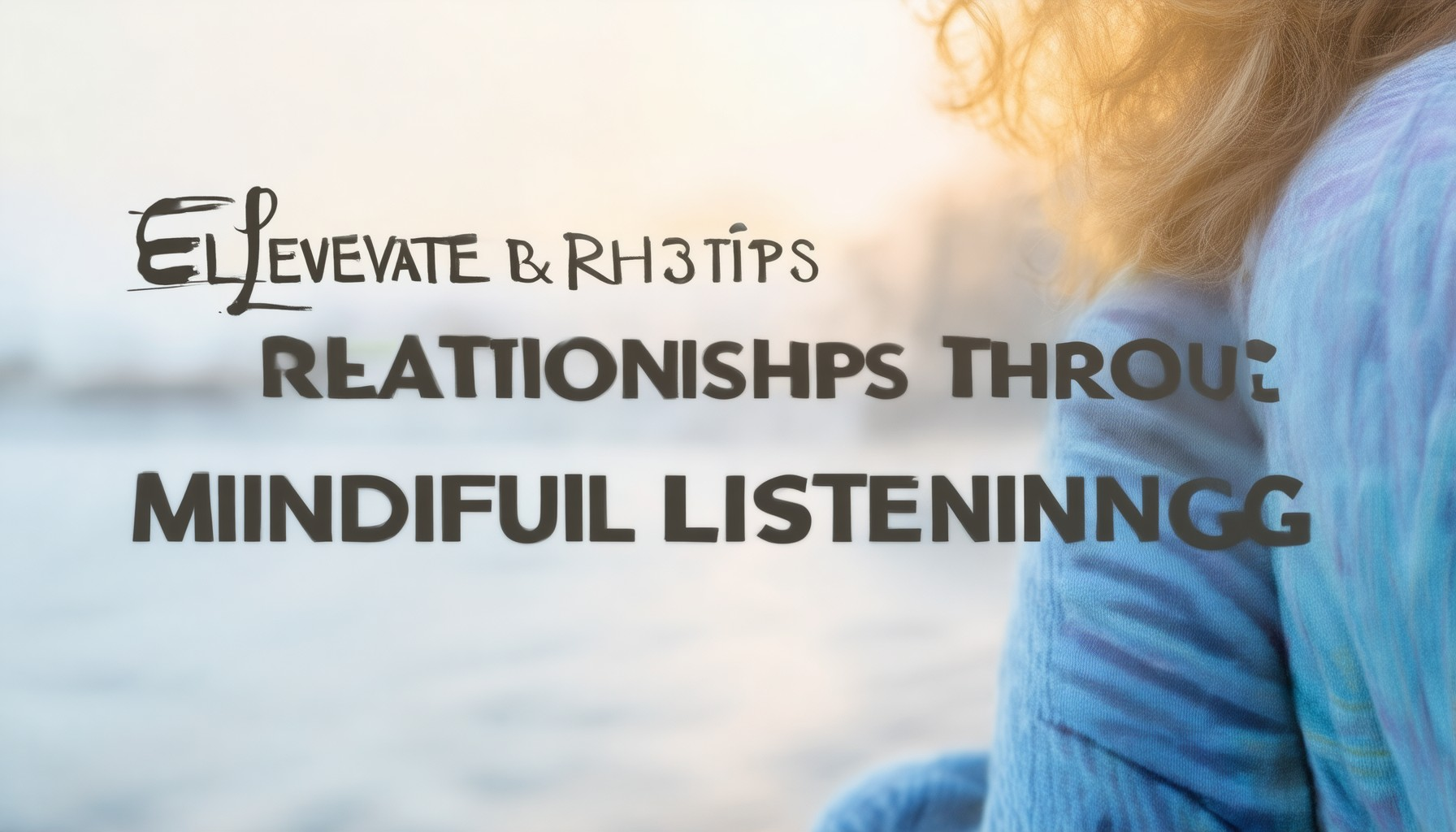Mindful listening is often cited as a cornerstone of strong and meaningful relationships, yet many people struggle to fully grasp its significance or implement it effectively. This article delves into why mindful listening plays such a vital role in fostering deeper connections, reducing misunderstandings, and creating a more harmonious environment. From understanding the essence of mindful listening to exploring its practical applications, we will explore how this simple yet powerful practice can elevate your relationships to new heights. Whether you’re looking to improve communication in personal bonds or professional interactions, mastering the art of mindful listening can make a transformative difference in how you connect with others.
Key Takeaways
– Fosters Emotional Intimacy: By deeply connecting with others through mindful listening, you build a safe space for open dialogue, enhancing trust and intimacy in relationships.
– Enhances Communication Quality: Mindful listeners engage fully, avoiding interruptions and creating deeper, more meaningful conversations that lead to stronger relational bonds.
– Reduces Conflict Resolution Struggles: Approaching discussions with curiosity and compassion allows for effective conflict addressing, fostering collaboration and minimizing misunderstandings.
– Strengthens Relational Bonds: Mindful listening creates a foundation of understanding and empathy, fortifying connections between individuals.
– Promotes Personal Growth: Reflecting on reactions during listening encourages self-awareness, contributing to healthier relationship dynamics.
– Encourages Meaningful Conversations: Valuing the speaker’s perspective leads to richer interactions where both parties feel appreciated.
– Builds Trust and Understanding: Present, non-judgmental listening demonstrates commitment to others’ thoughts and feelings, strengthening relationships.
Why is Mindful Listening Important in Relationships?
Mindful listening plays a pivotal role in fostering healthy and meaningful relationships. It involves fully concentrating on the speaker, understanding their emotions, and responding thoughtfully rather than merely waiting for your turn to speak. Here’s why it matters:
- Effective Communication: Mindful listeners often find it easier to engage in meaningful conversations, leading to clearer and more honest exchanges.
- Heightened Empathy: By attentively listening, you gain insight into your partner’s thoughts and feelings, deepening your understanding and connection.
- Better Conflict Resolution: Approaching conflicts with mindfulness can prevent escalations, allowing both parties to express themselves calmly and constructively.
- Building Trust: Consistently showing that you value your partner’s perspective fosters trust, which is foundational to any relationship.
- Emotional Support: Actively listening demonstrates care and concern, providing comfort and reassurance during challenging times.
- Promoting Personal Growth: Learning from others’s experiences can offer fresh perspectives and opportunities for self-improvement, benefiting both individuals involved.
By practicing mindful listening, you create an environment where relationships thrive, characterized by empathy, understanding, and mutual respect.
Improving Relationships Through Mindful Listening
Mindful listening is a powerful tool for fostering stronger connections and improving relationships. By adopting mindful practices, you can enhance communication and deepen your emotional bonds. Here’s how to effectively practice mindful listening:
- Be Present:** Fully engage with the speaker by avoiding distractions. Put away devices and give the conversation your undivided attention. Eye contact can further signal engagement.
- Stay Open-Minded:** Approach discussions with an open mind, resisting the urge to interrupt or jump to conclusions. Allow the speaker to express themselves without judgment or premature responses.
- Acknowledge Feelings:** Show understanding through verbal cues like nodding or saying “I see.” Reflecting back what the speaker says using their exact words reinforces their feelings of being heard.
- Practice Empathy:** Imagine yourself in the speaker’s position. Respond with compassion by asking clarifying questions, such as, “That sounds challenging. How are you managing that?”
- Be Patient:** Allow the speaker to fully express themselves without rushing to offer solutions. Give them space to share their emotions and thoughts.
- Manage Your Reactions:** Stay focused on the conversation without letting your mind wander. Practice mindfulness techniques like deep breathing to stay centered.
- Express Gratitude:** Value the opportunity to listen by appreciating the speaker’s openness. Thank them for sharing, which demonstrates your commitment to the conversation.
- Reflect Post-Conversation:** Afterward, take a moment to review the discussion. Note key points or emotions to reinforce the connection and understanding formed.
By integrating these mindful listening practices into your interactions, you can cultivate deeper, more meaningful relationships.
Improving Relationships Through Mindful Listening
Mindful listening is a powerful tool for fostering stronger connections and improving relationships. By adopting mindful practices, you can enhance communication and deepen your emotional bonds. Here’s how to effectively practice mindful listening:
- Be Present:** Fully engage with the speaker by avoiding distractions. Put away devices and give the conversation your undivided attention. Eye contact can further signal engagement.
- Stay Open-Minded:** Approach discussions with an open mind, resisting the urge to interrupt or jump to conclusions. Allow the speaker to express themselves without judgment or premature responses.
- Acknowledge Feelings:** Show understanding through verbal cues like nodding or saying “I see.” Reflecting back what the speaker says using their exact words reinforces their feelings of being heard.
- Practice Empathy:** Imagine yourself in the speaker’s position. Respond with compassion by asking clarifying questions, such as, “That sounds challenging. How are you managing that?”
- Be Patient:** Allow the speaker to fully express themselves without rushing to offer solutions. Give them space to share their emotions and thoughts.
- Manage Your Reactions:** Stay focused on the conversation without letting your mind wander. Practice mindfulness techniques like deep breathing to stay centered.
- Express Gratitude:** Value the opportunity to listen by appreciating the speaker’s openness. Thank them for sharing, which demonstrates your commitment to the conversation.
- Reflect Post-Conversation:** Afterward, take a moment to review the discussion. Note key points or emotions to reinforce the connection and understanding formed.
By integrating these mindful listening practices into your interactions, you can cultivate deeper, more meaningful relationships.
What Does Mindful Listening Bring to Relationships?
Mindful listening plays a pivotal role in strengthening and enriching relationships by promoting empathy, understanding, and connection. It goes beyond mere active listening; it involves being fully present, non-judgmental, and open to the speaker’s perspective.
- Fosters Emotional Intimacy: By truly paying attention to the speaker’s words and emotions, mindful listeners create a safe space for open dialogue, leading to greater trust and intimacy in relationships.
- Improves Communication Quality: Mindful listeners are less likely to interrupt or rush the speaker, allowing for deeper and more meaningful conversations. This often leads to more productive exchanges and stronger relational bonds.
- Reduces Conflict Resolution Struggles: By approaching discussions with curiosity and compassion, conflicts can be addressed more effectively. Mindful listening helps individuals understand each other’s perspectives, reducing misunderstandings and fostering collaboration.
- Promotes Personal Growth: Engaging in mindful listening allows both parties to reflect on their own reactions and responses, encouraging self-awareness and personal development. This can lead to healthier relationship dynamics overall.
Mindful listening isn’t just about receiving information—it’s about connecting on a deeper level. By being present and non-judgmental, you show the speaker that their thoughts and feelings matter, which in turn strengthens the relationship.
For more insights into building meaningful connections, explore resources from platforms like Chris and One , which offer practical tips and guided practices for mastering mindful communication. Additionally, exploring articles on sites like Greater Good Magazine or Psychology Today can provide further understanding of the impact of mindful listening in relationships.
What Does Mindful Listening Bring to Relationships?
Mindful listening plays a pivotal role in strengthening and enriching relationships by promoting empathy, understanding, and connection. It goes beyond mere active listening; it involves being fully present, non-judgmental, and open to the speaker’s perspective.
- Fosters Emotional Intimacy: By truly paying attention to the speaker’s words and emotions, mindful listeners create a safe space for open dialogue, leading to greater trust and intimacy in relationships.
- Improves Communication Quality: Mindful listeners are less likely to interrupt or rush the speaker, allowing for deeper and more meaningful conversations. This often leads to more productive exchanges and stronger relational bonds.
- Reduces Conflict Resolution Struggles: By approaching discussions with curiosity and compassion, conflicts can be addressed more effectively. Mindful listening helps individuals understand each other’s perspectives, reducing misunderstandings and fostering collaboration.
- Promotes Personal Growth: Engaging in mindful listening allows both parties to reflect on their own reactions and responses, encouraging self-awareness and personal development. This can lead to healthier relationship dynamics overall.
Mindful listening isn’t just about receiving information—it’s about connecting on a deeper level. By being present and non-judgmental, you show the speaker that their thoughts and feelings matter, which in turn strengthens the relationship.
For more insights into building meaningful connections, explore resources from platforms like Chris and One , which offer practical tips and guided practices for mastering mindful communication. Additionally, exploring articles on sites like Greater Good Magazine or Psychology Today can provide further understanding of the impact of mindful listening in relationships.
What Benefits Does Mindful Listening Bring to Relationships?
Mindful listening plays a vital role in fostering strong and meaningful relationships. Here are the key benefits:
- Improved Understanding : By actively listening without judgment, you gain a deeper comprehension of others’ perspectives, leading to more effective communication and mutual respect.
- Reduced Misunderstandings : Mindful listeners are less likely to interrupt, allowing the speaker to express themselves fully. This minimizes misinterpretations and misunderstandings.
- Deeper Emotional Connections : Engaging fully in conversations fosters empathy and compassion, strengthening emotional bonds and building trust.
- Conflict Resolution : Approaching conflicts with mindful listening allows for a more balanced perspective, facilitating collaborative solutions and reducing escalation.
- Active Recall : Focusing intently on the conversation enhances memory retention, helping you recall important details and maintain clear communication.
- Non-Verbal Insight : Attending to body language and tone provides valuable clues about emotions, enhancing your ability to connect with others on a deeper level.
- Stress Reduction : Engaging mindfully in conversations can alleviate stress, making interactions smoother and more enjoyable.
- Meaningful Conversations : Mindful listening encourages exchanges where both parties feel valued, leading to richer and more significant interactions.
By practicing mindful listening, you contribute to healthier, more fulfilling relationships built on understanding, empathy, and connection.









0 Comments